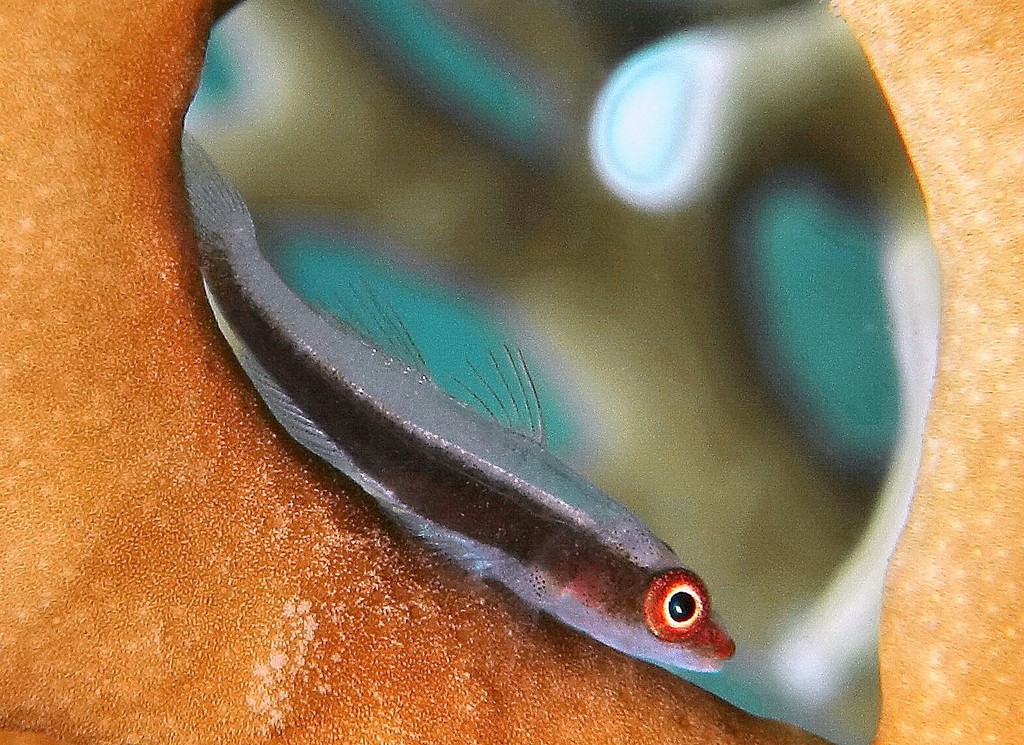BRYANINOPS NEXUS - (LARSON, 1987)
Picture courtesy of: Jack Berthomier (Flicker)
Actinopterygii (Gigaclass) > Actinopteri (Class) > Teleostei (Subclass) > Gobiiformes (Order) > Gobioidei (Suborder) > Gobiidae (Family) > Gobiinae (Subfamily) > Bryaninops (Genus)
Gobie renversé, Gobie nain renversé, Upside-down goby, Purple coral goby, Nexus goby, Nexus whipgoby, Hitomishiri-haze, ヒトミシリハゼ, 单鼻珊瑚鰕虎鱼,
Description
Dorsal spines (total): 7; Dorsal soft rays (total): 7-8; Anal spine: 1; Anal soft rays: 7-8; Pectoral fin rays: 15-16: Longitudinal scale series: 33-41; Transverse scale count backward: 7-12; Segmented caudal rays: 17, branched caudal rays: 11. Body slender, compressed, more rounded anteriorly. Body depth at anus average: 13.5%-17.0% (usually: 15%). Head rounded in cross-section, with large eyes occupying most of sides of head and extending into dorsal profile. Head depth about equal to or little less than head width. Eyes average 38% of head length (34.1%-41.3%), always greater than snout length (which is 25% of head length). Pectoral fin rays unbranched, not thickened; Pelvic disc a shallow cup; Gill opening usually reaching to below middle or rear half of eye. Gill rakers on first arch short, with no spines. Gill rakers on second arch equally short, and with several forwardly pointing fine spines. Max. length: 2.3 cm SL. Depth range: 3 - 50 m.
Color
A semi-transparent goby with a dusky stripe on the side of the snout, a broad reddish brown stripe to purplish from behind the eye to the top of the abdomen and running along the lower side to the caudal fin base.
Etymology
Bryaninops: from the former similar or related genus Bryanina now, Sicyopterus + from Ancient Greek, óps = eye, face, appearance.
nexus: from Latin, nectere = the act of binding together, bond. Referring to fused anterior and posterior nostrils, leaving an oval area with a raised rim.
Original description: Bryaninops nexus Larson, 1987 - Type locality: Escape Reef Lagoon, Queensland, Australia, depth 10 meters, D.F. Hoese, November 1981.
Distribution
Actinopterygii (Gigaclass) > Actinopteri (Class) > Teleostei (Subclass) > Gobiiformes (Order) > Gobioidei (Suborder) > Gobiidae (Family) > Gobiinae (Subfamily) > Bryaninops (Genus)
Gobie renversé, Gobie nain renversé, Upside-down goby, Purple coral goby, Nexus goby, Nexus whipgoby, Hitomishiri-haze, ヒトミシリハゼ, 单鼻珊瑚鰕虎鱼,
Description
Dorsal spines (total): 7; Dorsal soft rays (total): 7-8; Anal spine: 1; Anal soft rays: 7-8; Pectoral fin rays: 15-16: Longitudinal scale series: 33-41; Transverse scale count backward: 7-12; Segmented caudal rays: 17, branched caudal rays: 11. Body slender, compressed, more rounded anteriorly. Body depth at anus average: 13.5%-17.0% (usually: 15%). Head rounded in cross-section, with large eyes occupying most of sides of head and extending into dorsal profile. Head depth about equal to or little less than head width. Eyes average 38% of head length (34.1%-41.3%), always greater than snout length (which is 25% of head length). Pectoral fin rays unbranched, not thickened; Pelvic disc a shallow cup; Gill opening usually reaching to below middle or rear half of eye. Gill rakers on first arch short, with no spines. Gill rakers on second arch equally short, and with several forwardly pointing fine spines. Max. length: 2.3 cm SL. Depth range: 3 - 50 m.
Color
A semi-transparent goby with a dusky stripe on the side of the snout, a broad reddish brown stripe to purplish from behind the eye to the top of the abdomen and running along the lower side to the caudal fin base.
Etymology
Bryaninops: from the former similar or related genus Bryanina now, Sicyopterus + from Ancient Greek, óps = eye, face, appearance.
nexus: from Latin, nectere = the act of binding together, bond. Referring to fused anterior and posterior nostrils, leaving an oval area with a raised rim.
Original description: Bryaninops nexus Larson, 1987 - Type locality: Escape Reef Lagoon, Queensland, Australia, depth 10 meters, D.F. Hoese, November 1981.
Distribution
Western Pacific: Ryukyu Islands (Japan) and Palau south to Queensland (Australia) and New Caledonia.
Biology
Occurs on lagoon reefs and hovers upside-down among thickets of the staghorn coral Acropora muricata (Linnaeus, 1758). Often seen resting on underside of coral branches and makes short forays into water column to feed on planktons.
Biology
Occurs on lagoon reefs and hovers upside-down among thickets of the staghorn coral Acropora muricata (Linnaeus, 1758). Often seen resting on underside of coral branches and makes short forays into water column to feed on planktons.
Last update: 25, May 2024
